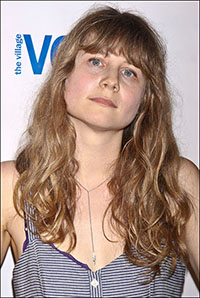
*
"We have the power of artists to move our society forward. We can't be behind it," Dominique Morisseau said, reflecting on the lack of diversity in theatre.
This diversity — sexual, racial and economic — was one of many topics that Morisseau, Annie Baker and Sheila Callaghan discussed with Playbill.com. The three playwrights are currently participating in the Sundance Institute Theatre Lab, a three-week play development retreat designed to support the creation of new work by playwrights, directors, composers and librettists. And while all three playwrights are women, their experiences and work reflect a great deal of diversity.
Morisseau's Detroit '67 won the Edward M. Kennedy Prize for Drama Inspired by American History. She is also the author of Sunset Baby and Follow Me To Nellie's. Her produced one-acts include Third Grade; Black at Michigan; Socks; Roses Are Played Out; Love and Nappiness; love.lies.liberation; Bumrush; and The Masterpiece.
Baker, a Pulitzer Prize winner for The Flick, is also author of Body Awareness, Circle Mirror Transformation, The Aliens and an adaptation of Uncle Vanya. At Sundance, she is writing and will direct The Last of the Little Hours.
Callaghan's works include Scab; Lascivious Something; Dead City; That Pretty Pretty (Or, The Rape Play); Everything You Touch; and Port Out, Starboard Home.
The trio of playwrights shared their opinions the list recently distributed by The Kilroys, personal advocation of work and the lack of diversity in the theatre.
 |
||
| Sheila Callaghan |
"I just assumed that everybody knew about unconscious bias and that directors that were producing seasons entirely by white men were aware of their own unconscious bias. 'Yeah, I'm a white man producing a series of work by white men,'" she recalled. "I couldn't believe when these conversations about gender parity started that certain artistic directors didn't talk to their own unconscious bias, which is something we all have. That they actually sort of claimed an objectivity when it came to deciding the merits of the piece of art — this season of white men just happened to be a season of white men because those are the best plays. It stunned me. I actually didn't think anyone in this day and age was still capable of thinking they didn't have unconscious bias. I do think The Kilroys is part of a continuation and reminder of we all have that, it's still happening and we need to work really hard."
Callaghan added, "I don't think our field is healthy when we have a dearth of a variety. A field is healthy when it's filled with variety and it's filled with people taking risks."
The lack of risks being taken in the field of theatre is also a cause of concern for Morisseau, who compared the theatre industry to the music industry, which she said has changed drastically in recent years. "I think we're running the risk of in our industry of being very limited," she said. "And that model hasn't worked. It's killing other industries. In the music industry, for instance, the model of carbon copying another artist doesn't work any more, because artists are independent now. Artists don't want to be put into that box. They leave the music labels and become independent artists, and they can make more money and become more famous than they can if they're trying to fit in the box the label is making for them. Theatre is like the last of that movement that has not shifted into finding a new model. And I think that they're trying to run popularity contests instead of just producing work that is new and brave — taking risks — and trying to cultivate new audiences. I think they're becoming slaves to the same audience. They're not going to move the theatre forward."
The lack of productions by female playwrights was not the only aspect of theatre the women weighed in on; they also spoke about the lack of diversity in class and race represented on stage and behind the scenes.
 |
||
| Annie Baker |
||
| Photo by Joseph Marzullo/WENN |
Morisseau recalled the experience of her play Detroit '67, which was presented as part of the Public Lab series in association with the Classical Theater of Harlem and the National Black Theater, where it moved after the Public run. Morisseau said the audiences who saw the play in Harlem, who may have otherwise attended the Public Theater, had a very different experience uptown, which she credited with widening their perspectives as to what theatre can be and what kind of experience audiences can have while watching a performance, which she described as "completely different and exciting and open."
In order for more diversity to make it to the stage, the playwrights said some of the responsibility falls upon artistic directors to select a more diverse range of works by a more diverse group of artists.
"There's a vicious cycle where people program plays for rich white audiences and get scared of programming a new play for fear of alienating a rich white audience," Baker said. "If you just decide to not make fear-based decisions about programming, I feel like the entire theatre can change, and the entire theatre culture can change. I'm not an artistic director, and I don't know what it's like to have a livid subscriber base. But I just think that being scared of the subscribers doesn't get anyone anywhere."
Morisseau spoke of the idea of "slots" in a season, where one work by a woman or one work by a playwright of color is programmed, and after that work is decided upon, women and people of color are no longer considered for the season.
"I have to recognize where I'm being produced or when I make a list; many people do not and so the problem is not over because you let one in the door," Morisseau said. "The problem's over when we don't even need to have a one — when there's abundance happening around our industry. And so right now I'm in a position where I'm a produced playwright but I can tell you that I'm in one slot a year. And if that slot gets covered by a woman, then I'm looking for the people of color slot. And if that slot gets filled, then I know I'm out... We have to change an entire model."
Along with artistic directors, the responsibility also falls upon the artists themselves, Callaghan said. "It's just that we're socialized in some level to not want to speak up for ourselves, to not want to advocate for ourselves. To understand the world is the way the world is and we're going to do our little thing in a corner and hopefully someone will notice us. And I feel like that's the attitude shift — that the onus falls on the part of the artist to start speaking up for ourselves, advocate for ourselves the way men have in the past."
"I think a lot of times — not even just women — a lot of stuff we're saying about women is happening to communities of color, and of our industry in general, because I think in general, artists and playwrights are not willing to step up and speak up for themselves or speak out when they feel an injustice has happened because they're afraid of being blacklisted," Morisseau added. "They're afraid that once they've spoken about something, they've thrown a theatre under the bus or thrown someone under the bus. And therefore we're kind of shamed into silence, and I think we have to look at models in the past and realize nothing ever moves in silence."
Morisseau stressed the need for change within the industry, saying, "If you want theatre to continue to be exciting for new generations and not stop at the generation it is right now, I think you have to open things up. I think you'll see a brand-new theatre audience and you'll see theatre becoming exciting in pockets of communities it wasn't exciting in before."










